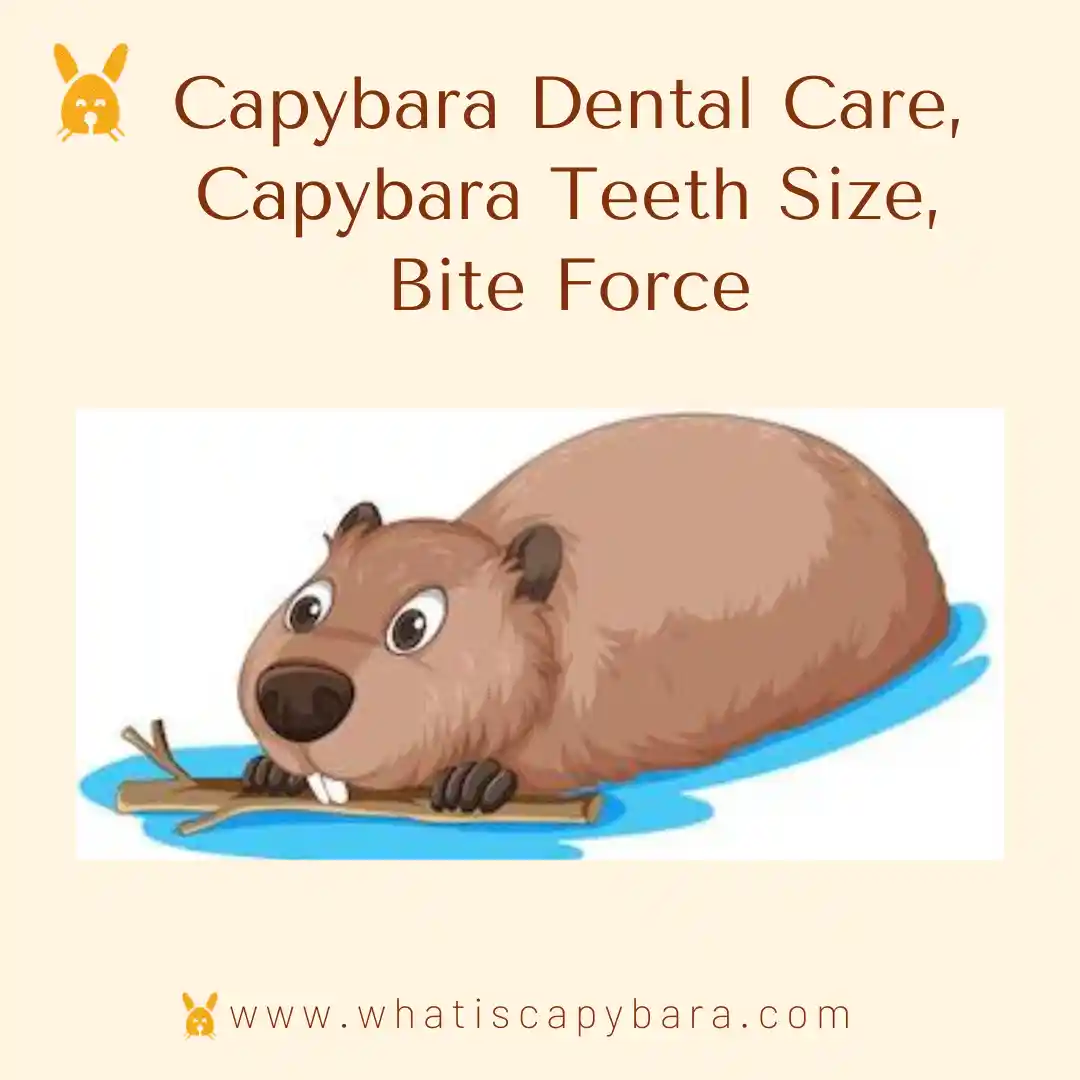Capybara dental care is very important and you should keep your capybara teeth healthy. You see, capybara teeth are not just ordinary teeth; they play a crucial role in their survival.
Capybaras, which happen to be nature’s largest rodents, also require proper dental care to ensure their oral health.
Being a capybara owner for more than 5 years I can tell you how you can take care of your capybara’s teeth, dental hygiene, capybara teeth size, capybara teeth facts, etc.
Contents
Capybara Dental Care – Caring for Capybara Teeth
Maintaining proper dental care for capybaras is essential for their overall health and well-being. Here are some steps to ensure their teeth remain healthy:
A Balanced Diet:
Providing a balanced diet is crucial for capybara dental health. Their diet should primarily consist of high-quality grass hay, fresh vegetables, and limited amounts of fruits.
Ensuring they have access to proper forage can help stimulate their natural chewing behavior and wear down their continuously growing teeth.
What Do Capybaras Eat – Diet, Nutrition, Weight, Food Chain
Dental Examinations:
Regular veterinary check-ups are essential to monitor the dental health of capybaras.
A qualified veterinarian can examine their teeth, identify any issues such as overgrowth, misalignment, or dental diseases, and provide appropriate treatment if necessary.
Dental examinations should be a part of routine healthcare for capybaras.
Dental Wear:
As capybara teeth continue to grow, it is important to ensure they wear down naturally.
Providing them with appropriate chew toys or branches can help facilitate natural wear and prevent the development of sharp edges or overgrown teeth.
These materials should be safe for capybaras to chew on and help maintain dental health.
Dental Hygiene:
Although capybaras do not require regular brushing like humans, maintaining good oral hygiene is still important.
Ensuring a clean environment with proper sanitation can prevent the accumulation of bacteria or food debris that may lead to dental issues.
Regularly cleaning their enclosure and providing fresh, clean water can help maintain oral health.
Observing Eating Habits:
Keeping a close eye on the eating habits of capybaras can provide insights into their dental health.
If they experience difficulties while eating, such as excessive drooling, loss of appetite, or showing signs of pain, it may indicate dental problems.
Promptly consulting a veterinarian in such cases is crucial to address any underlying dental issues.
Professional Dental Care:
In certain cases, capybaras may require professional dental care. This can include procedures such as filing down overgrown teeth, extracting damaged or infected teeth, or treating dental diseases.
It is vital to seek the assistance of a veterinarian experienced in exotic animal dentistry to ensure proper treatment and minimize discomfort for the capybara.
How Many Teeth Does a Capybara Have?
Capybaras have 20 teeth, starting at the front of their mouth, capybaras have two pairs of incisors, which are followed by two pairs of premolars and three pairs of molars on each side of their upper and lower jaws. This dental arrangement is represented by the dental formula 1/1, 0/0, 1/1, 3/3.
Capybara Teeth Size
Capybara’s incisors teeth size measure around 2-3 cm long. These incisors continue to grow throughout their lives, much like other rodent species.
Capybaras have teeth that are uniquely adapted to their herbivorous diet. These magnificent creatures boast sharp incisors, along with large cheek teeth, all serving specific purposes.
It’s truly fascinating to observe the intricate design of capybara teeth and how they are perfectly suited for their herbivorous lifestyle.
The continuous growth compensates for the wear and tear caused by their herbivorous diet, which consists of tough vegetation.
Capybara Bite Force
Capybaras possess a surprisingly strong bite force. While exact measurements are challenging to obtain, estimates suggest that their bite force can reach around 1,000 pounds per square inch (psi).
To put that into perspective, the average human bite force is approximately 162 psi. This formidable bite force is necessary for capybaras to gnaw through vegetation, including bark, stems, and roots.
Their powerful jaws and bite force also serve a defensive purpose. When faced with a threat, capybaras can deliver a strong bite, which can deter predators and help protect themselves and their group members.
However, it is important to note that capybaras are generally docile and only resort to aggression when they feel threatened or cornered.
Capybara Bites: Report of Human Injury Caused by a Hydrochoerus hydrochaeris
Capybara Teeth Facts
- Lifelong Growth:
- As mentioned earlier, capybara teeth have a unique characteristic of continuous growth.
- This adaptation allows their teeth to compensate for the constant grinding and wearing down caused by their vegetarian diet.
- Self-Sharpening Teeth:
- Capybaras have enamel ridges on their incisors.
- These ridges help their teeth self-sharpen as they chew, ensuring their ability to cut through tough vegetation remains efficient.
- Herbivorous Diet:
- Capybaras are strict herbivores, mainly feeding on grasses, aquatic plants, and various fruits.
- Their teeth are well-adapted to grinding and chewing fibrous vegetation, making them efficient grazers.
- Teeth for Social Interactions:
- Capybara teeth also play a role in social interactions.
- During dominance displays or territorial disputes, capybaras may bare their teeth, signaling their position and intentions to other individuals.
To Wrap Up
Capybara dental care is an essential aspect of their overall well-being. These large rodents rely on their formidable teeth for feeding, defense, and social interactions.
Understanding the unique features of capybara teeth, such as their size, bite force, and continuous growth, provides insights into their dental needs.
By following proper dental care practices, including a balanced diet, regular veterinary check-ups, providing appropriate chew materials, and maintaining good oral hygiene, capybaras can enjoy optimal dental health.
Regular monitoring and prompt veterinary attention can help prevent and address dental issues, ensuring the comfort and longevity of these fascinating creatures.
Remember, capybara dental care should always be performed under the guidance of a qualified veterinarian who specializes in exotic animal dentistry.
By prioritizing their oral health, we can ensure that capybaras continue to thrive and enchant us with their unique charm as nature’s largest rodents.

